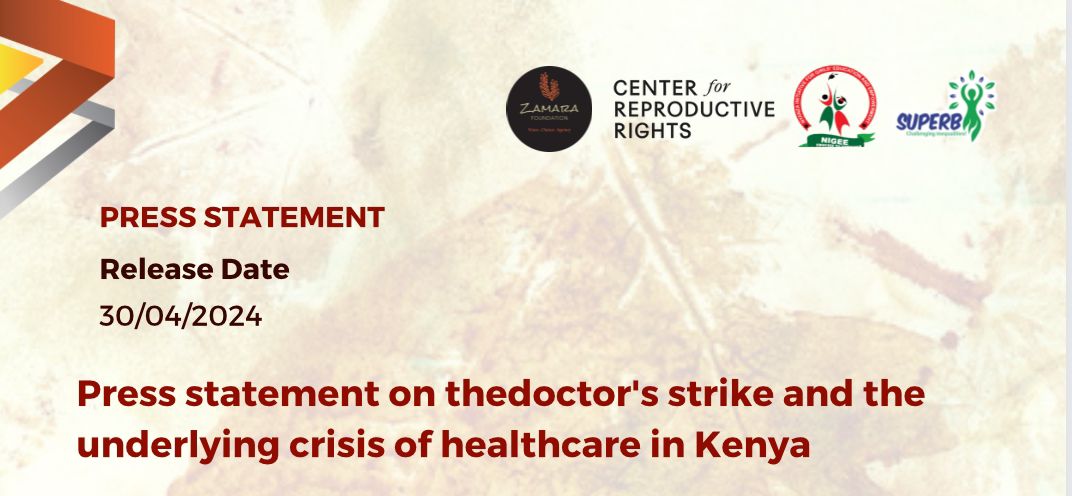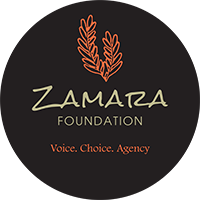
Press Statement on the Doctor’s Strike and the underlying crisis of healthcare in Kenya
Zamara Foundation, in collaboration with the Center for Reproductive Rights, Nyanza Initiative for Girls Education and Empowerment (NIGEE) and Superb CBO, are deeply concerned about the grave implications of prolonged doctors’ strike onthe sexual and reproductive health of adolescents, girls, and women in Kenya. We are committed to advancing gender equality and ensuring access to comprehensive Sexual Reproductive Health and Rights (SRHR) services, and recognize the profound impact of the strike on maternal health and essential SRHR information and services. This situationraises fundamental questions about the right to health as enshrined in the Constitution of Kenya. Article 43(1)(a) affirmsevery person’s right to the highest attainable standard of health, including access to healthcare services, while Article43(2)(a) mandates emergency medical treatment to be provided without denial. Furthermore, Article 43(2) (c) ensures that access to healthcare services, including reproductive healthcare, cannot be denied due to an inability to pay. The government must protect constitutional provisions, ensuring uninterrupted essential healthcare services, particularly those related to SRHR.
The ongoing doctors’ strike has severely disrupted access to essential Reproductive, Maternal, Newborn, Child, and Adolescent Health (RMNCAH) services. This has affected adolescents, including pregnant teenagers and teen mothers,leaving them vulnerable to a myriad of health complications. The withdrawal of the EduAfya Insurance Scheme has left nearly 3.4 million students vulnerable to medical challenges, reversing its gains and worsening the well-being of adolescents in public secondary schools, particularly from low-income families. The withdrawal of the Linda Mama maternal healthcare scheme by the Kenyan government has also disrupted access to quality maternal care nationwide, leaving expectant mothers,including adolescents, without access to free healthcare. This could potentially lead to increased maternal mortality rates, limitedaccess to prenatal and postnatal care, and financial strain for vulnerable women.
Despite these challenges, healthcare workers have demonstrated remarkable resilience and dedication in delivering essentialSexual and Reproductive Health and Rights (SRHR) services, including contraceptives and safe and legal abortionservices. Their unwavering commitment to patient care underscores the critical importance of investing in a robust,supportive healthcare system capable of withstanding external disruptions. This crisis has sparked crucial conversationsabout the systemic issues driving healthcare disparities, highlighting the urgent need for structural reforms, gender- inclusive budgets, and gender-sensitive policies within the Ministry of Health. Addressing these issues will build a more equitable and resilient healthcare system that prioritizes the well- being of all individuals, especially vulnerable populations like adolescents and expectant mothers.
Strengthening health system resilience is essential to prevent future disruptions to reproductive healthcare services.This involves implementing multi-sectoral policies, enhancing community participation in healthcare decision-making, and integrating SRHR services into primary healthcare as outlined in the Sustainable Development Goals (SDGs) and Essential Public Health Functions (EPHF). By fortifying the healthcare system, the government can ensure continuousaccess to essential services, thereby promoting adolescents’ health and well-being and contributing to the president’sdevelopment agenda.
The Department of Reproductive and Maternal Health (DRMH) within the Ministry of Health must take immediate action to end the ongoing doctor’s strike by prioritizing the recruitment and retention of healthcare professionals in reproductive healthcare specialities, promoting gender equality in healthcare, strengthening health system resilience, and increasing funding to SRHR programs tailored to the unique needs of adolescents and young people. This comprehensive approach is essential for safeguarding adolescent health, promoting gender equity, and advancing Kenya’s development agenda. By adopting policies that prioritize the well-being of healthcare workers, address workplace gender discrimination, and ensure gender-inclusive budgetary allocation, the Ministry of Health can foster a supportive working environment conducive to delivering high-quality SRHR services tailored to the diverse needs of women and girls.
We also call on the Ministry of Health to prioritize programs catering to the unique needs of adolescentsand young people, including access to contraceptives, maternal health services, prevention of unsafe abortion,comprehensive sexuality education, and youth-friendly clinics. This will empower adolescents to make informed decisionsabout their health, ultimately contributing to their overall well-being and development.
For more details, contact us through; info@zamarafoundation.org
Download full statement HERE
